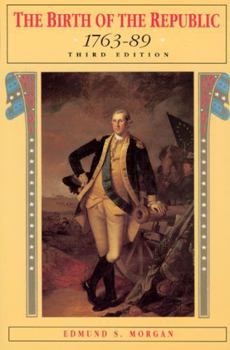The Birth of the Republic, 1763-89
(Part of the The Chicago History of American Civilization Series)
Select Format
Select Condition 
Book Overview
In one remarkable quarter-century, thirteen quarrelsome colonies were transformed into a nation. Edmund S. Morgan's classic account of the Revolutionary period shows how the challenge of British taxation started the Americans on a search for constitutional principles to protect their freedom and eventually led to the Revolution.
Format:Paperback
Language:English
ISBN:0226537579
ISBN13:9780226537573
Release Date:February 1993
Publisher:University of Chicago Press
Length:224 Pages
Weight:0.50 lbs.
Dimensions:0.7" x 5.3" x 8.0"
Customer Reviews
5 ratings
A breif history of revolutionary times
Published by Thriftbooks.com User , 21 years ago
This book is a great over view of the time before, during, and after the revolution. I must confess that I read this as a required text book for my American history class. It is the first and possibly only text book that I can say I liked well enough to read all the way through and like it. This book goes very breifly over the events in a very readable fashion. Those studying history (such as myself) can always read a companion to the revolution along with it to go more in depth into the revolution. For those who only want a brief history this book is perfect.
The basic facts of the American Revolution explained
Published by Thriftbooks.com User , 21 years ago
Originally published in 1956 and revised in 1977, this book is probably familiar to a couple of generations of college students. This may well be the most accessible overview of the formative history of America. As an overview, of course, it does not go into great detail about the myriad of topics debated by historians still today, but it does hit most of the predominant features of the Revolutionary story. Morgan builds his work around the premise that the Founding Fathers did indeed operate on principle in building a new nation and that the struggle eventually framed itself as a pursuit of equality among all men. He admits that many of the decisions made by the leaders of the Revolution did equate to economic or property gains for themselves, but he argues that this is not contradictory at all with a commitment to liberty because liberty in the 18th century essentially hinged on land ownership. He also rationalizes the contradiction of slavery's continued existence being incorporated into the Constitution by arguing that the convention delegates acted out of urgent concern for the future of a government in its death throes at the hands of a powerless Congress as set up by the Articles of Confederation--without such compromise, the important new Constitution could not have been ratified by a sufficient number of states before the young nation collapsed at the feet of the British and Spanish. Morgan first examines the increasingly rocky relationship between the English Parliament and the colonies--specifically, the debate over taxation and infringement of liberties that led up to the declaration of independence. He devotes a few pages to the war but does not delve very deeply into military matters. Morgan does an excellent job explaining why the Articles of Confederation failed and how the problems of that system were widely recognized, frankly debated, and resolved in the creation of a new national government established upon the bedrock of a new federal Constitution. Aside from Morgan's excellent treatment of the birth of the American republic, this book also features the texts of the Declaration of Independence, Articles of Confederation, and federal Constitution; a timeline of important events; and a pretty expansive discussion of source materials published before 1977. In sum, this book is ideal for anyone just wanting to learn or review the pivotal events surrounding the creation of the United States without having to sift through scholarly criticisms and debates of important yet secondary aspects of the story.
The best, most readable intro to the Revolution
Published by Thriftbooks.com User , 23 years ago
Edmund Morgan remains America's most readable colonial historian after a half-century of writing. This short volume is still my favorite book about the American Revolution. Written in clear, readable prose that anyone with half-a-brain could understand and enjoy, "The Birth of the Republic" covers all the major bases from 1763 to the Constitutional Convention in 1789. Primarily a political history, readers seeking for a military history should look elsewhere. But for almost fifty years, this book has remained in print, luring readers into a deeper appreciation of our most important piece of history: when the American colonies began to separate themselves from the British Empire, deciding that one's political liberties were more sacred than loyalty to a crown. While in retrospect we can now see that there was little tyranny actually being practiced against the colonies, the fear itself of what dangerous precedent might bring remains with us today. A truly marvelous book, both for a general audience and for those with historical awareness. I first read this book as a student; now, as a history teacher, I give it to my own students with the greatest of anticipated joy: that they too will find this short book as wonderful as any they have ever read.
Good Job Morgan
Published by Thriftbooks.com User , 26 years ago
Morgan does a great. I used to be so confused about history, but not any more. His chronilogical order makes history so easy and understandable.
Wonderful!
Published by Thriftbooks.com User , 26 years ago
This book presents the American Revolution as a great conflict, not just of men or nations, but of ideas. It tells, not just about the battles, but about the reasons behind the battles. It is the best history book that I have ever encountered





